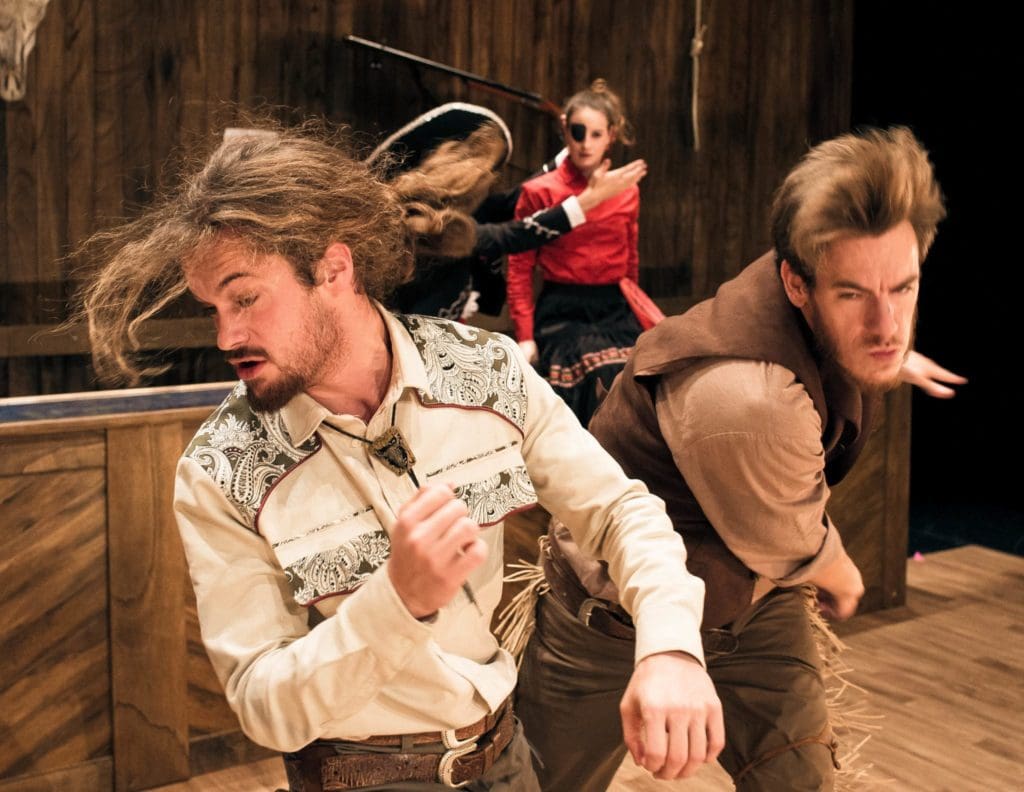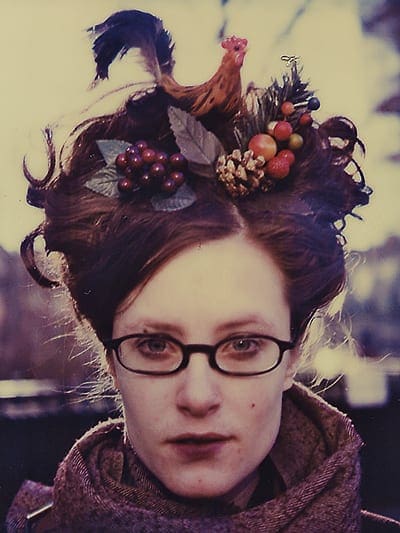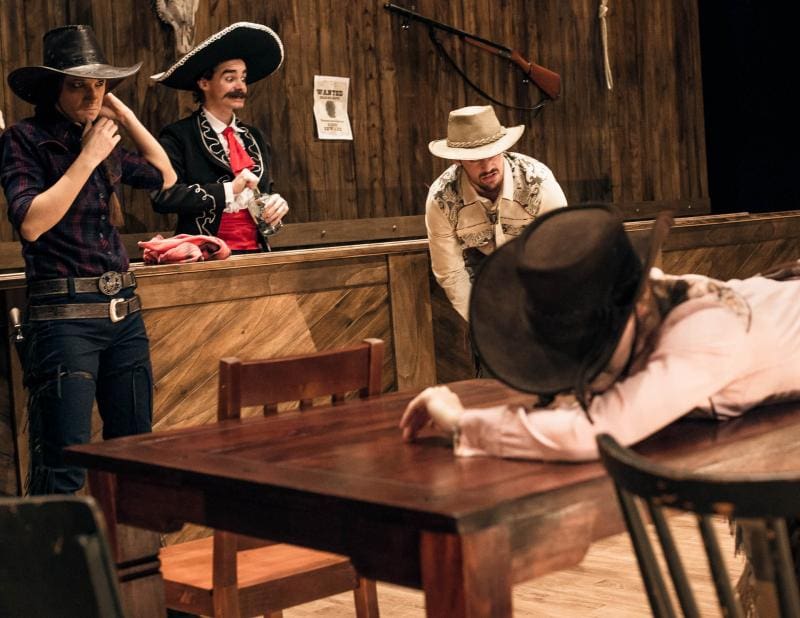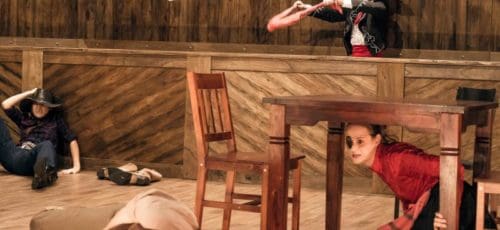Following the American Dream: Kelly Copper on Pursuit of Happiness
What is happiness, and to what ends will we pursue it? Kelly Copper and Pavol Liska, co-directers of the OBIE-winning Nature Theater of Oklahoma, explore this question in Pursuit of Happiness, a work of dance-theater made in collaboration with Slovenia-based dance troupe EN-KNAP Group. The dancers follow the American dream from the American West to the Middle East, along the way bending and challenging genres and perceptions of reality. This piece comes to Philadelphia on September 20 and 21 for the 2019 Fringe Festival. FringeArts talked to Kelly Copper in May 2019 about the creation of and ideas behind this wild, wild work.
FringeArts: What inspired this piece?
Kelly Copper: We don’t typically work from inspiration—but from opportunity. We had had an invitation before from EnKnap in Ljubljana to come and work with their dancers on a project, but at the time we were at work on Life and Times, and struggling with the impossible task of keeping our own company going and that project moving forward. We couldn’t take a time out. Thankfully Iztok Kovac, the company’s director, did not give up. And he finally did hit us at the perfect time. We had finished Life and Times, had no company of actors of our own and were at a moment of personally questioning whether we were interested anymore in making theater—where the pleasure was exactly, in our work and in our life—where was the greater purpose—and whether were we kidding ourselves that there could be a utopian vision for all that. We were disillusioned and broken a bit when we met the dancers of EnKnap, and the process of making this piece was a process of remaking and reimagining ourselves and our work.
Up until this project we had been working with recorded phone conversations as text. Though Pavol and I started as playwrights, we felt we had to disable ourselves in order to discover anything new, so we worked with “found” materials, audio recordings, etc. This piece was part of a process of rediscovering language, finding pleasure in writing again. And also, for the dancers—none of whom had spoken on stage before—a discovery of the voice and its physicality and its relationship to audience.
We were working in Slovenia for short stretches (two weeks here, three weeks there) during the course of 2015–2016, and finally premiered the project just a week after the election of Donald Trump. So we were Americans thinking about America in a foreign land. We had originally brought a book of “Cowboy Dances” as a kind of something to play with during our first meeting with the dancers. It’s an illustrated and very obsessively descriptive manual for square dances from the 1930s—something a friend had given us years ago, and since it had “dance” in the title, we felt it could be common ground with the dancers. And as we worked on trying to figure out from the descriptions what some of these dances looked like, we felt a bit playful about this old kind of frontier idea of America. We bought cowboy boots and hats when we went back to NY, and wore them when we were walking around Ljubliana. It felt a little bit awkward being American and we wanted to play with the trappings and rediscover some of the ideas that felt essential to this “being American”.
FringeArts: What appeals to you about working with EN-KNAP?
Kelly Copper: It was a very good experience for us—the dancers were generous and hard working. We worked in brief bursts over the course of two years, and every time we came back you could see they had worked on their voices, on what they could do—they were thinking deeply about the project. In the end they pushed us to be constantly inventing new challenges for them. They kept us on our feet!
FringeArts: What themes and ideas did you talk about during creation and rehearsals?
Kelly Copper: We don’t really talk about ideas so much during rehearsals. We play. Hard. We test things out, we work with what’s available to us, we try to stay open in the process, not shut it down with ideas of where we want things to go too soon. If you start out knowing exactly where you want to go it’s pretty boring and ultimately predictable. We generally take longer to develop something, but we have a good time doing it.
For example the saloon came up during rehearsals because there was a ballet “barre” in the studio where we worked and we just started using it as a bar. Then the performers were getting too good at speaking the text, and we wanted to challenge them further so we asked them to speak in a southern accent and chew tobacco. In the end it all comes together to form something, and of course you’re thinking all the time—but this is subterranean. Surprising and hopefully inevitable.
FringeArts: What were those subterranean thoughts?
Kelly Copper: Obviously we took our work—and also our fun—very seriously, and so I don’t want imply the show is just a hilarious yuck fest, because it’s not. There’s a lot of despair about what it means to be an American and an artist who desperately wants to make a difference and wishes they could change the world, but is so flawed a human being that they just make a mess of their biggest dreams. That’s not idle metaphor for us. It wasn’t like we came in with “this is the idea”—we remained open and playful but also open to some serious thinking and fully engaged with the world around us, the people we were working with, the country we are living in, and also the life we were living at the time and our own personal failures.
FringeArts: How did the settings and performance style contribute to exploring those themes and ideas?
Kelly Copper: We don’t set out in advance and decide “well, let’s dress them as cowboys and have them chew tobacco and set this thing in a bar and that will hi-light these themes and ideas…” It’s more a playful exploration of circumstance and opportunity. It’s about what’s in the room—who are we working with (in this case we were enjoying the cultural cacophony of six dancers from Hungary, Croatia, Belgium, Slovenia, Sweden and the UK all trying to speak in a southern accent), what we have available (ballet barre) and you just keep tossing things up in the air. One day Luke, one of the dancers, brought in a bunch of cowboy hats he had purchased at a costume shop—some things are just fun. And then at a certain point it all starts to line up.
It’s also about what’s in the world outside the rehearsal room as well. In our case the making of this piece fatefully sort of lined up with the election of Donald Trump who was another kind of American myth and monster … you cannot even imagine these things sometimes when you start working.
While we work, of course, Pavol and I are usually reading a lot and watching a lot, and we share with each other what we find that speaks to us or points us in a certain direction. I remember for me, at the time I was reading a book of film criticism by David Warshow which included a piece called “The Westerner” on the moral code of westerns and its relation to America, and also “The Gangster as Tragic Hero” which was about gangster films. There was another article in this book, as well, on the structure of war movies. In the end, I think you can see traces of all of these in the piece, as well as our preoccupation with poetic meter and isochrony (part of our rediscovery of language and the pleasure of writing). All of the first half of the performance is written in iambic pentameter—so yeah, themes and ideas we don’t generally discuss, but you can certainly see the obsessions and preoccupations which underlie a spirit of openness and play of rehearsal, and all contribute to the final project.
FringeArts: What’s your favorite Western?
Kelly Copper: Oh, we did watch a few, and we’re, of course, huge cinephiles. I have always loved Once Upon a Time in The West. Possibly a tie between that and The Searchers for me.
— Introductory text by Seth Boyce
What: Pursuit of Happiness
When: September 20 + 21, 2019
Where: Mandell Theater at Drexel University, 3220 Chestnut Street
Cost: $15–$35
Created by Nature Theater of Oklahoma/En-Knap Group
https://fringearts.com/event/pursuit-of-happiness/
Interview with EN-KNAP’s Bence Mezei here
Photos by Andrej Lamut





